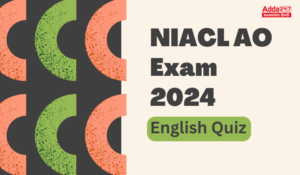Directions (1-10): Read the following passage carefully and answer the questions given below it. Certain words are given bold to help you to locate them while answering some of the questions.
The great majority of men and women, in ordinary times, pass through life without ever contemplating or criticizing, as a whole, either their own conditions or those of the world at large. They find themselves born into a certain place in society, and they accept what each day brings forth, without any effort of thought beyond what the immediate present requires. Almost as instinctively as the beasts of the field, they seek the satisfaction of the needs of the moment, without much forethought, and without considering that by sufficient effort the whole conditions of their lives could be changed. A certain percentage, guided by personal ambition, make the effort of thought and will which is necessary to place themselves among the more fortunate members of the community; but very few among these are seriously concerned to secure for all the advantages which they seek for themselves. It is only a few rare and exceptional men who have that kind of love toward mankind at large that makes them unable to endure patiently the general mass of evil and suffering, regardless of any relation it may have to their own lives. These few, driven by sympathetic pain, will seek, first in thought and then in action, for some way of escape, some new system of society by which life may become richer, full of joy, and less full of preventable evils than it is at present. But in the past such men have, as a rule, failed to interest the very victims of the injustices which they wished to remedy. The more unfortunate sections of the population have been ignorant, apathetic from excess of toil and weariness, timorous through the imminent danger of immediate punishment by the holders of power, and morally unreliable owing to the loss of self-respect resulting from their degradation. To create among such classes any conscious, deliberate effort after general amelioration might have seemed a hopeless task, and indeed in the past it has generally proved so. But the modern world, by the increase of education and the rise in the standard of comfort among wage-earners, has produced new conditions, more favourable than ever before to the demand for radical reconstruction. It is above all the Socialists, and in a lesser degree the Anarchists (chiefly as the inspirers of Syndicalism), who have become the exponents of this demand.
What is perhaps most remarkable in regard to both Socialism and Anarchism is the association of a widespread popular movement with ideals for a better world. The ideals have been elaborated, in the first instance, by solitary writers of books, and yet powerful sections of the wage-earning classes have accepted them as their guide in the practical affairs of the world. In regard to Socialism this is evident; but in regard to Anarchism it is only true with some qualification. Anarchism as such has never been a widespread creed; it is only in the modified form of Syndicalism that it has achieved popularity. Unlike Socialism and Anarchism, Syndicalism is primarily the outcome, not of an idea, but of an organization: the fact of Trade Union organization came first, and the ideas of Syndicalism are those which seemed appropriate to this organization in the opinion of the more advanced French Trade Unions. But the ideas are, in the main, derived from Anarchism, and the men who gained acceptance for them were, for the most part, Anarchists. Thus we may regard Syndicalism as the Anarchism of the market-place as opposed to the Anarchism of isolated individuals which had preserved a precarious life throughout the previous decades. Taking this view, we find in Anarchist-Syndicalism the same combination of ideal and organization as we find in Socialist political parties
Q1. In can be inferred from the passage that the “few rare and exceptional men” are…
(a) Socialists
(b) Utopians
(c) Anarchists and Syndicalists
(d) Revolutionaries
(e) Apartheid
Q2. According to the passage, why did the “rare and exceptional men” fail in the past?
(a) The governments suppressed the ideas of equality and freedom brutally.
(b) The oppressed people were morally unreliable and there was no system that they could rely on to take them out of the depravity.
(c) The oppressed people were incapable of noticing the contradictions in society.
(d) They were victims of injustices, ignorance, oppression and morally unreliable.
(e) They were morally unreliable and depravity and was guided by personal ambition
Q3. According to the passage, the prerequisite for the radical reconstruction of society is/are…
A. Popular education
B. An improved standard of living
C. Sympathetic leaders
D. Socialist or Anarchist ideals
(a) A and B
(b) A, B, and C
(c) D only
(d) All of the above
(e ) A only
Q4. It can be inferred from the passage that Anarchism is…
(a) Syndicalism at the level of vast populations.
(b) Socialism at the level of organizations.
(c) Socialism at the level of vast populations.
(d) Syndicalism at the level of organizations.
(e) Socialism of vast populations
Q5. What is the main purpose of the passage?
(a) A historical survey of certain political ideals.
(b) To emphasize the difference between Socialism, Anarchism, and Syndicalism.
(c) To describe the origin of certain political ideals.
(d) To study the political movements under Socialism, Anarchism, and Syndicalism.
(e) To describe Syndicalism is primarily the outcome, not of an idea
Q6. Which of the following is most nearly similar in meaning of the word contemplating as used in the passage?
(a) discard
(b) slight
(c) envisage
(d) reject
(e) scorn
Q7. Which of the following is most nearly similar in meaning of the word instinctively as used in the passage?
(a) distinct
(b) unlikely
(c) equivocally
(d) intuitively
(e) movement
Q8. Which of the following is most nearly opposite in meaning of the word Toil as used in the passage?
(a) grind
(b) dormancy
(c) give
(d) exertion
(e) moil
Q9. Which of the following is most nearly opposite in meaning of the word Apathetic as used in the passage?
(a) uninterested
(b) indifferent
(c) eager
(d) lackadaisical
(e)parochial
Q10. Which of the following is most nearly opposite in meaning of the word Anarchists. as used in the passage?
(a)calm
(b)arrogant
(c)apartheid
(d) instinct
(e) fidelity




 Practice for English Section: 15 Cloze T...
Practice for English Section: 15 Cloze T...
 Bank Exams के लिए Error Correction, Gram...
Bank Exams के लिए Error Correction, Gram...
 English Quiz For NIACL AO Mains 2024 Exa...
English Quiz For NIACL AO Mains 2024 Exa...










